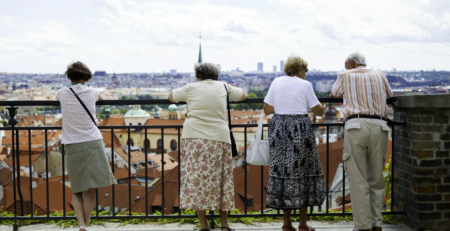China to expand national pilot project for hospice care, further improve humanistic care for elderly with an aging society
China will expand its national pilot project for hospice care with a third batch of pilot areas, further improving humanistic care for the elderly and the terminally ill across the country, a move to cope with the nation’s rapidly aging population.
China’s National Health Commission (NHC) has issued a notice announcing the third batch of places, which include three provincial-level places – Beijing, East China’s Zhejiang, Central China’s Hunan – and another 61 cities or districts such as Nankai district in Tianjin Municipality, where the hospice care pilot project will be carried out.
Since China’s top health authority launched the project in 2017, a total of 185 pilot cities or districts across the country have been set up across three pilot batches, according to media reports.
According to media reports, Chinese population aged 60 or above reached 280 million at the end of 2022, a continued intense increase in the aging population. Statistics from China’s National Health Commission show that the total number of the elderly aged 60 and above is predicted to exceed 300 million during the 14th Five-Year Plan period (2021-25).
How to cope with this increase in elderly people who face their final phase of life and improve their quality of life has become a serious challenge.
Hospice care refers to the physical, mental and spiritual care of elderly patients and terminally ill patients, improving their life quality so they may pass away with comfort, peace and dignity.
The expansion of the hospice care pilot project reflects a deepening recognition of the need to actively cope with an aging society and is a demonstration of the shift from general problem solving to the development of a high-quality response, Yao Yuan, an expert from the China Population Association who has long been engaged in aging issues told the Global Times on Sunday.
According to Yao, the topic of hospice care has been talked about positively and formally in government reports and scholars’ discussions in recent years.
“In regard to end-of-life care, we have a more profound recognition that the elderly have spiritual and emotional demands that we have to care about to improve their quality of life,” Yao added.
With the development of society, some senior citizens also hope that they can get attentive and dignified treatment at the last phase of their lives and have their wills respected and followed, according to Yao.
According to the latest NHC notice, medical institutions with permitted conditions can set up independent hospice centers according to their respective functions and positions. By 2025, each pilot city, county or district will have at least one hospice care ward. A hospice service system that covers the entire pilot area, with both urban and rural areas taken into consideration, is expected to be established.
The notice suggested that hospice care services be actively carried out at geriatric medicine, oncology, pain management and other departments at medical institutions.
The notice also required the improvement of supporting policies, including establishing a pricing system, exploring a payment system, increasing financial support, establishing a referral mechanism, formulating standards and norms, and ensuring the supply of medicine.
The NHC will promote the inclusion of institutional and home hospice services into basic health insurance and long-term care insurance, benefiting patients with government-financed services.
Read more @globaltimes











